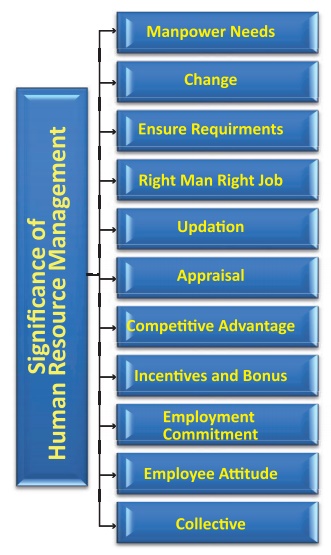Chapter: 12th Commerce : Chapter 9 : Human Resource Management : Fundamentals of Human Resource Management
Significance of Human Resource Management
Significance of Human Resource
Management
The strategic role of human resource management is
the process of acquiring, training, appraising, and compensating employees, and
attending to their labour relation, health, safety and fariness concerns.
There are various reasons why human resource
management is important. They are as follows:

1. To identify manpower needs :
Determination of manpower needs in an organisation
is very important as it is a form of investment. The number of men required are
to be identified accurately to optimise the cost.
2. To incorporate change : Change is constant in any
organisation and this change has to be introduced in such a way that the human
resource management acts as an agent to make the change effective.
3. To ensure the correct requirement of manpower: At any time the organisation should not suffer from shortage or
surplus manpower which is made possible through human resource management.
4. To select right man for right job: Human resource management ensures the right talent
available for the right job, so that no employee is either under qualified or
over qualified.
5. To update the skill and knowledge: Managing human resource plays a significant role in the process of
employee skill and knowledge enhancement to enable the employees to remain up
to date through training and development programmes.
6. To appraise the performance of employees: Periodical appraisal of performance of employees through human
resource management activities boosts up good performers and motivates slow
performers. It helps the workforce to identify their level of performance.
7. To improve competitive advantage: Organisations with capable and competent employees can truly gain
competitive advantage in the globalised market. Higher the level of good
performers greater the possibility of fast paced growth of the enterprise.
8. To provide incentives and bonus to best performers: It is the role of human resource management to recognise the
best performers and to provide them with bonus and incentives as a form of
appreciation for their work. This motivation can be either financial or non
financial.
9. To determine employee commitment: Human resource management determines the level of commitment of
employees to their work either through interview or questionnaire. The higher
the level of commitment the higher the possibility of the organisation to be
successful. This can be carried out through appropriate policies.
10. To emphasise socialisation: Human beings are social animals and they
should be
ensured that they are comfortable in the work place by maintaining cordial
relationship with peers, subordinates and managers so as to contribute maximum
to the organisation.
11. To promote favourable employee attitude: Organisations
are expected to provide a good work environment to secure favourable employee
attitude towards the management. This can be accomplished through conflict
resolution, counselling, grievance reprisals etc.
12. To provide scope for collective bargaining: Human resource management encourages workforce to form a union to
represent their grievances and find early solution for their problems by
collective representation.
Related Topics